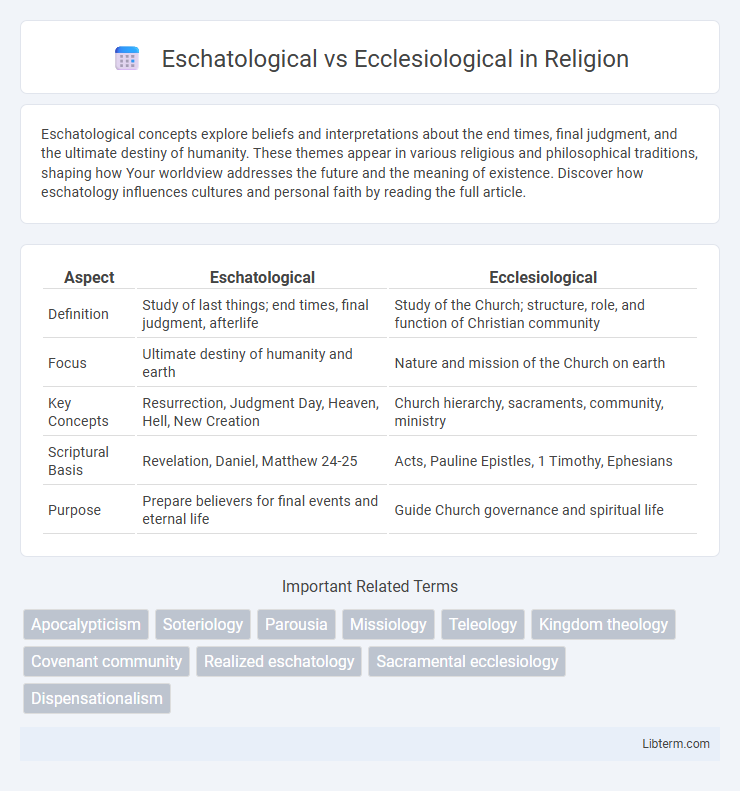Eschatological concepts explore beliefs and interpretations about the end times, final judgment, and the ultimate destiny of humanity. These themes appear in various religious and philosophical traditions, shaping how Your worldview addresses the future and the meaning of existence. Discover how eschatology influences cultures and personal faith by reading the full article.
Table of Comparison
| Aspect | Eschatological | Ecclesiological |
|---|---|---|
| Definition | Study of last things; end times, final judgment, afterlife | Study of the Church; structure, role, and function of Christian community |
| Focus | Ultimate destiny of humanity and earth | Nature and mission of the Church on earth |
| Key Concepts | Resurrection, Judgment Day, Heaven, Hell, New Creation | Church hierarchy, sacraments, community, ministry |
| Scriptural Basis | Revelation, Daniel, Matthew 24-25 | Acts, Pauline Epistles, 1 Timothy, Ephesians |
| Purpose | Prepare believers for final events and eternal life | Guide Church governance and spiritual life |
Defining Eschatological and Ecclesiological Perspectives
Eschatological perspectives focus on the study of end times, final judgment, and the ultimate destiny of humanity according to religious beliefs, emphasizing prophetic events and the fulfillment of divine promises. Ecclesiological perspectives center on the nature, structure, and function of the Church, analyzing its role in worship, community, and spiritual governance. Understanding these distinct frameworks is crucial for interpreting theological doctrines and their implications for faith and practice.
Historical Development of Eschatology
The historical development of eschatology reveals evolving interpretations of end-time events rooted in biblical prophecy, notably within Christian theology. Early eschatological perspectives emphasized imminent apocalyptic expectations, later transitioning into more symbolic and institutional understandings influenced by ecclesiological frameworks. This progression shaped doctrinal distinctions between eschatological hope concerning ultimate destiny and ecclesiological concerns with the nature and mission of the church.
The Evolution of Ecclesiology in Christian Thought
Eschatology explores the ultimate destiny and final judgment in Christian theology, whereas ecclesiology studies the nature, structure, and mission of the Church as a living community. The evolution of ecclesiology in Christian thought reveals a dynamic shift from a hierarchical institution to a participatory body reflecting eschatological hope and divine communion. This development underscores the Church's role not only as a spiritual authority but also as an eschatological sign of God's kingdom on earth.
Key Differences: Eschatological vs Ecclesiological Views
Eschatological views center on the study of end times, focusing on concepts like judgment, resurrection, and the final destiny of souls. Ecclesiological perspectives examine the nature, structure, and function of the Church as a community of believers and its role in salvation history. Key differences lie in eschatology's emphasis on future divine fulfillment, whereas ecclesiology addresses present institutional and spiritual realities within the Church.
Eschatology’s Influence on Christian Doctrine
Eschatology profoundly shapes Christian doctrine by addressing the ultimate destiny of humanity, the second coming of Christ, and the final judgment, which frames the ethical and moral expectations within the faith. Key theological concepts such as resurrection, eternal life, and the kingdom of God derive from eschatological beliefs that influence worship, hope, and the interpretation of Scripture. This forward-looking perspective informs ecclesiological structures and practices by underscoring the church's mission to prepare believers for the fulfillment of divine promises.
The Role of Ecclesiology in Church Structure
Ecclesiology shapes the church's hierarchical and communal framework by defining roles, authority, and governance within congregations. It provides doctrinal clarity on the church's function as the body of Christ, guiding liturgical practices and communal worship. The influence of ecclesiology ensures organizational coherence and spiritual unity, distinguishing it from eschatological concerns rooted in end-time doctrines.
Intersections and Tensions Between Eschatology and Ecclesiology
Eschatology and ecclesiology intersect in their shared concern with the ultimate fulfillment and purpose of the Church, where eschatological hope shapes ecclesiological identity by emphasizing the Church as the inaugurated kingdom of God awaiting consummation. Tensions arise as eschatology projects a future, often transcendent reality, while ecclesiology requires present, tangible community and structure, leading to debates over the Church's role in manifesting eschatological promises now versus embodying them fully only in the future. These dynamic interactions influence theological frameworks and ecclesial practices, challenging the balance between anticipating Christ's return and actively living out kingdom values in the present age.
Contemporary Debates: Future Hope vs Present Community
Contemporary debates in theology often contrast eschatological perspectives, which emphasize future hope and the ultimate fulfillment of God's kingdom, with ecclesiological views that focus on the present community's role in embodying divine ideals. Eschatology highlights the anticipation of Christ's return and the final consummation of history, driving a forward-looking faith dynamic. Ecclesiology centers on the church as the living body of believers actively engaging in social justice, worship, and communal life, underscoring the importance of present experience and transformative action.
Implications for Faith Practice and Spiritual Life
Eschatological themes emphasize the ultimate fulfillment of God's kingdom and the hope of resurrection, shaping faith practice toward anticipation and perseverance in spiritual life. Ecclesiological perspectives focus on the nature and mission of the Church as the body of Christ, impacting communal worship, sacraments, and ethical conduct within Christian communities. The interplay between eschatology and ecclesiology fosters a dynamic faith experience that balances future hope with present responsibility.
Bridging Eschatological and Ecclesiological Perspectives in Theology
Bridging eschatological and ecclesiological perspectives in theology deepens the understanding of the church's role in God's redemptive plan by connecting the ultimate destiny of humanity with the present mission of the church. This integration highlights how eschatological hope shapes ecclesiological identity, encouraging believers to live faithfully in anticipation of the Kingdom of God while actively participating in communal worship and service. The fusion of these perspectives promotes a holistic theology that balances future-oriented promises with present church realities, fostering spiritual growth and missional engagement.
Eschatological Infographic

 libterm.com
libterm.com